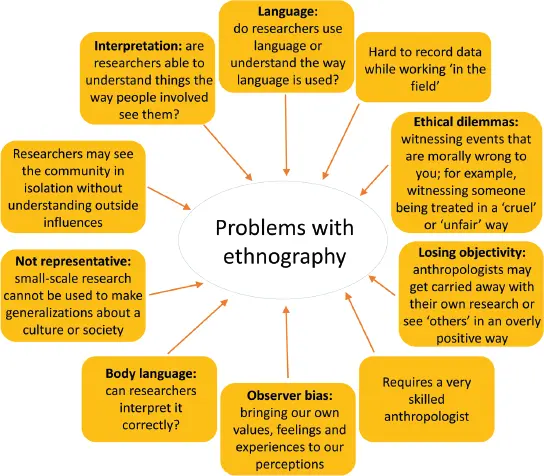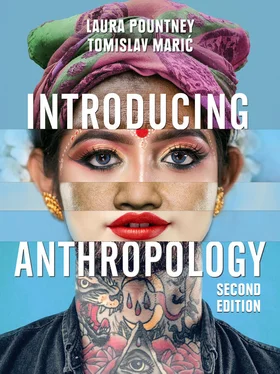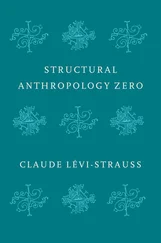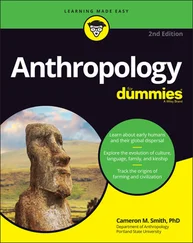BBC, The Incredible Human Journey (2009), presented by Alice Roberts
BBC, Origins of Us (2009), presented by Alice Roberts
BBC, Prehistoric Autopsy (2012), presented by Alice Roberts
BBC, Racism: A History (2007)
PBS, Race: The Power of an Illusion (2013) 3-part series
Vital Pictures, Herskovits at the Heart of Blackness (2009)
American Anthropological Association: www.understandingrace.org(a great website for understanding the concept of race and all the problems associated with it)
American Anthropological Association, Statement on Race: www.aaanet.org/stmts/racepp.htm
American Association of Physical Anthropologists: https://physanth.org/about/position-statements/aapa-statement-race-and-racism-2019/
Smithsonian Institution: http://humanorigins.si.edu(gives an excellent interactive overview of human evolution)
CHAPTER 2Research Methods
Contents
1 Key issues and debates
2 Ethnography
3 The history of anthropological research methods
4 Factors influencing choice of research method
5 Participant observation
6 Interviews
7 Life histories
8 Reflexivity in anthropology
9 Digital Anthropology
10 Conclusion
11 End-of-chapter questions
12 Key terms
13 Personal investigation
14 Suggested further sources
What is ethnography?
How do practical, ethical and theoretical issues affect the choice of research method?
What are the main advantages and disadvantages of using participant observation and unstructured interviews?
To what extent is fieldwork an objective research method?
How do digital environments and methodologies redefine ethnographic practice?
Anthropology as a discipline is unique in its commitment to explore human cultures. This chapter discusses only the research methods of social/cultural anthropology. Social anthropologists learn about the culture of another society most distinctively through fieldworkand first-hand observation in that society, although other methods are used as well. Anthropological research involves a range of methods, such as informal (unstructured) interviews, direct observation, participation in the life of the group, collective discussions, analyses of personal documents produced within the group, self-analysis, results from activities undertaken off- or online, and life histories over a prolonged period of time. These kinds of data are rich, detailed and qualitative, offering deep insight into the culture studied.
fieldworkThe firsthand observation of human societies
informal (unstructured) interviewsAn unstructured question-and-answer session in which the informant is encouraged to follow his or her own train of thought, wherever it may lead
These methods are also applied in the newer anthropological subdiscipline of digital anthropology, which explores the impact of digital culture in everyday life. This chapter looks at some of these research methods and at the practical, ethical and theoretical issues that are associated with them.
Probably the best explanation of what ethnography entails in terms of data collection is given by Martyn Hammersley and Paul Atkinson (2007[1990]: 3):
Ethnography usually involves the ethnographer participating in people’s daily lives for an extended period of time, watching what happens, listening to what is said, and/or asking questions through informal and formal interviews, collecting documents and artefacts – in fact, gathering whatever data are available to throw light on the issues that are the emerging focus of inquiry .
Ethnography usually involves a researcher studying a whole community of people, sometimes in a small town or village, or possibly part of a larger town. The method involves the researcher going to live among the people being studied and becoming involved in community life as a participant observer. The best way to understand people is to observe them by interacting with them over an extended period, sometimes years. Anthropologists have to share the lives of the people they are studying as much as possible. This experience is sometimes romanticized (seen as exciting or wondrous); however, in reality, most anthropologists work alone and experience loneliness, especially in the early stages of fieldwork. While fieldwork can be a challenging experience, almost all anthropologists find themselves assimilatingto the culture of their host communities to a greater or lesser degree.
assimilationThe absorption of an individual or minority group of people into another society or group, achieved by learning and adopting the cultural traditions of the society in which assimilation occurs; it is also often hastened by intermarriage and by de-emphasizing cultural and or biological differences

Figure 2.1Problems with ethnography
There are a number of advantages and limitations in ethnographic research methods. People can be studied when acting in ways they consider normal to them and may not be completely aware that they are being watched.
Define ethnography.
What is assimilation?
What role do you think the anthropologist should play when researching, and why?
Read the list of problems in Figure 2.1. Can you think of any others?
Put the problems in order of importance; be ready to justify your reasons.
What are the strengths of ethnographic research?
The history of anthropological research methods
Anthropology – the study of ‘humanity’ – grew from the intersection of European discovery, colonialism and natural science. In the early nineteenth century, anthropologists were interested in reconstructing the stages of social and cultural evolution. Early anthropologists such as Edward Burnett Tylor and Lewis Henry Morgan published influential works tracing everything from writing systems to marriage practices, from their primitive beginnings to the more complex modern state. Originally, anthropology was thought of as a discipline concerned with studying the ‘savage’. This meant that anthropologists researched societies that had either already, or would soon become, dominated territories within the European empires. By the beginning of the twentieth century, anthropologists were no longer content to rely on the accounts of non-specialists, such as colonial officials, missionaries and travellers, for their primary data, and they began themselves to go into ‘the field’ as ethnographers to gather information at first-hand. Observations made during the colonial era were later seen as flawed, as they had at their heart the idea that Western civilization represented the pinnacle of human evolution and that all other ways of life were inferior.
Although anthropology has changed quite a bit since then, ethnography remains one of the methods that distinguish it from the other social sciences, and the importance of doing ethnography is perhaps one thing on which all anthropologists agree. In the early part of the twentieth century, anthropology was typically concerned with small-scale, technologically simple societies. The purpose of this was partly to record ways of life that were changing under colonialism (they may well have been changing anyway – don’t assume that colonialism was the only reason). Today, anthropology has extended its area of interest into more developed societies, taking them all into account and treating them all as equally significant. Anthropologists retain their rich and detailed narrative approach (including storytelling), which reveals a lot about particular people and places. In the twenty-first century developments in digital technology have led anthropologists to study how humans interact with their technological devices, which has resulted in a new subdiscipline of digital anthropology.
Читать дальше













